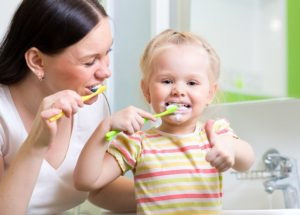
The health and development of your child’s smile plays an important role in their ability to chew and speak correctly while also impacting their confidence and overall health. However, children have unique needs and it can often be a challenge to teach them how to properly care for their teeth and gums. In addition to regular care from their pediatric dentist in Amherst, they also need to develop correct oral hygiene habits. To help set the right foundation for a lifetime commitment to their dental health, there are some simple tips you can use.
1. Start Early
One mistake parents commonly make is not starting oral hygiene habits early. They often wait until after a few primary teeth have erupted; however, dental care should start far sooner so it becomes part of their daily routine from a young age.
Even before the teeth erupt, use a soft wet cloth to clean their gums and cheeks. Not only does this help to rid their mouth of food particles and bacteria, but it also teaches them from a young age that they need to care for their teeth and gums twice a day.
2. Limit Sugary Snacks
Sugar is not just bad for your child’s overall health, but their teeth and gums as well. Although you cannot avoid sugar completely, you can limit their consumption and the damage it can cause. In addition to choosing healthy snacks, avoid giving them sugary drinks in between meals and never send them to bed with a bottle or sippy cup.
3. Make It a Family Event
As your child grows, their ability to care for their teeth and gums on their own will develop, but only if you take an active role in teaching them proper techniques and habits. While they are still young, you will need to brush for them; however, as they develop motor functions, they can begin taking on more responsibility with their dental hygiene.
As they age, they can start brushing and flossing on their own, but it is best if you are there with them to help ensure they do so correctly. After they have developed the proper techniques, you can then brush and floss next to them to set a positive example.
4. Don’t Skip Flossing
Although a toothbrush is vital to preventing dental health issues, flossing is equally as important. Your child should floss their teeth every night before going to bed. Teach them how to carefully and correctly clean between each tooth. Traditional floss can be difficult for them to use so consider using dental flossers or an oral irrigator until they are able to easily do it on their own.
5. Visit the Dentist Regularly
In addition to your child’s home oral hygiene habits, they need to see their dentist every six months for a cleaning and checkup. It is best to schedule their first visit before the age of one.
About Northampton Pediatric Dentistry
Northampton Pediatric Dentistry provides child-focused dental care to create healthy, beautiful smiles. If you have any questions about your child’s oral health, please contact our office to schedule a consultation.
